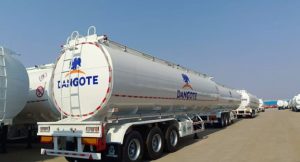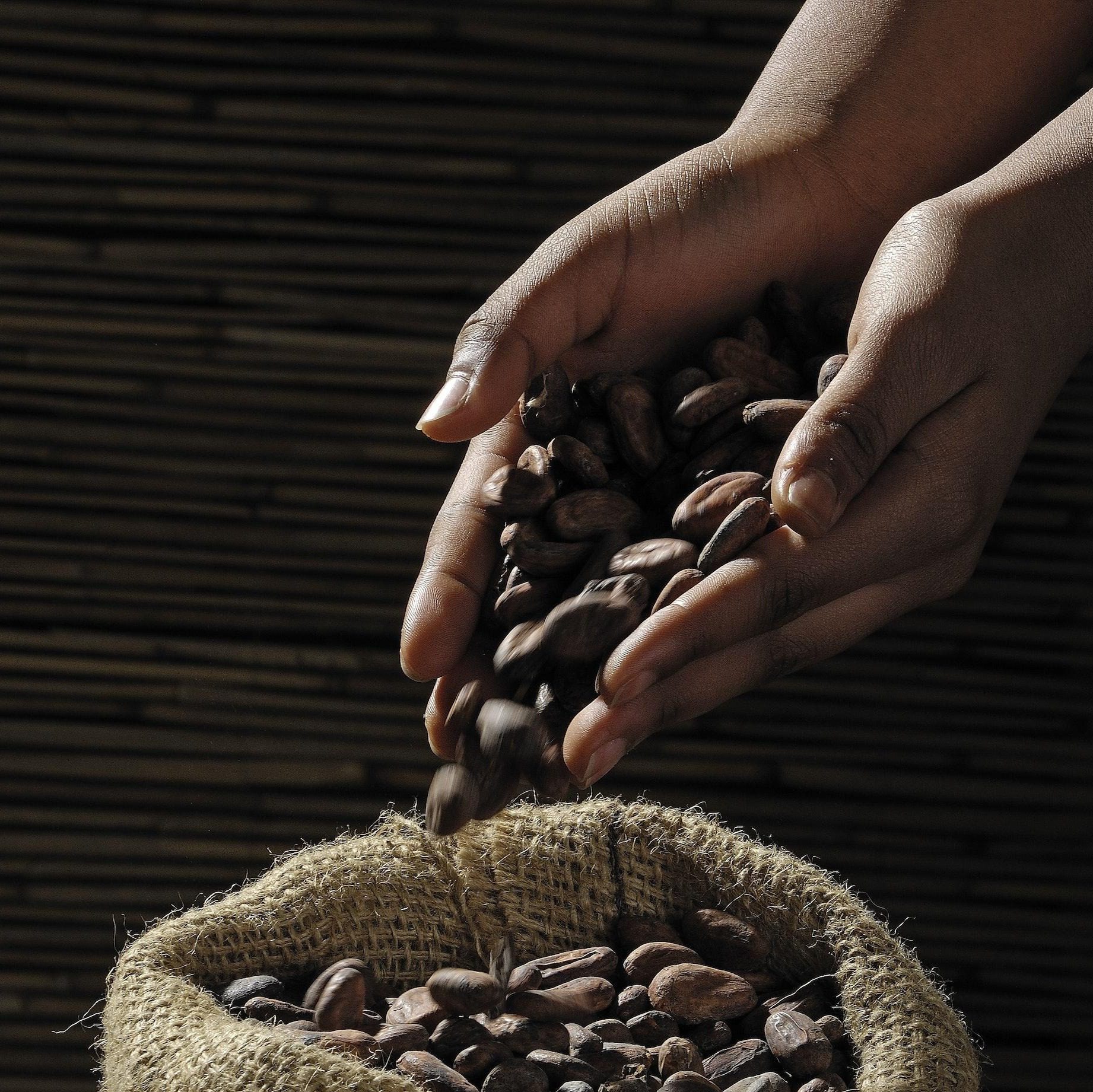DANGOTE’S 1,000 TRUCKS ARRIVE, FUEL DISTRIBUTION TO BEGIN FROM S’WEST
Barring any last-minute change in plan, the Dangote Petroleum Refinery is expected to start its direct fuel distribution scheme soon, as 1,000 Compressed Natural Gas-powered trucks required for the exercise have arrived in Nigeria. With the 1,000 trucks, the refinery would start distributing fuel directly to marketers in Lagos, Ogun, and other South-West states, pending the delivery of the remaining 3,000 trucks. Impeccable sources and officials at the $20bn Lekki-based plant, who did not want to be named due to a lack of authorisation to speak to the press, told our correspondent that more trucks have been coming into the country in batches. They expressed optimism that all the trucks would be delivered by the end of next month. The PUNCH exclusively reported last week that the planned fuel distribution by the Dangote refinery with the 4,000 CNG-powered trucks could not start on August 15 due to logistics challenges in China. The firm had earlier announced plans to kick off the direct fuel distribution exercise with the 4,000 CNG-powered trucks. The trucks were ordered from China to be delivered in Lagos for Dangote’s direct fuel distribution. However, the plan could not materialise because the company was only able to receive 450 trucks as of last week, with 150 on the way, bringing the total to 600 trucks last week. But on Sunday, sources within the company said the number of trucks received had risen to 1,000, while the remaining 3,000 are expected to arrive before the end of September. A very senior executive officer of the Dangote Group told our correspondent that there were not enough ships to transport the trucks to Nigeria from China. This challenge stalled the shipping of the trucks to Nigeria before August 15, when the scheme was supposed to commence. “There are not enough ships coming from China to handle 4,000 trucks and 4,000 tankers,” the source stated last week. He gave further insights, saying the Dangote Group received 200 trucks in the first shipment and 250 in the second batch, while another 150 were on a vessel. Meanwhile, sources told our correspondent on Sunday that more trucks were received in the previous week. According to the sources, all the trucks have been paid for and are ready to be conveyed to Nigeria, but this has been difficult due to insufficient ships to handle the logistics. With 1,000 trucks in custody, the fuel distribution will commence in Lagos and the South West before the scheme spreads to other zones as the remaining trucks arrive at the Lagos port. “We have received up to 1,000 trucks. More are still coming, and we believe all will be delivered by the end of September,” an inner source said. Another official stated, “We couldn’t start the fuel distribution scheme because of this logistics challenge in China. We didn’t expect that; we can only appeal to Nigerians to bear with us. However, we won’t wait until we receive all the trucks before we start. We will start the scheme soon with the available trucks. We will start with the South-West and extend it to other zones as we receive more trucks. By September, everything should be set. Nigerians should bear with us.” A consultant to the Dangote Group corroborated this, saying, “With the schedule we have, by the end of September, we shall be in possession of all the trucks. All the trucks are actually available in China. The remaining 3,000 are waiting for vessels to bring them to Nigeria. The logistics issue in China is our major challenge. “We’ve received 1,000 trucks in all, as of this weekend. We are likely going to start in Lagos and the South West. As more trucks come in, we will be moving to other regions. We are certain that before mid-September, we would have covered the major part of the country. As we receive all the trucks, the entire country will be covered.” Earlier, the company said that it was expecting 60 shiploads of the trucks in six weeks. “Over the next six weeks, the refinery expects at least 60 shiploads of these trucks to arrive in the country,” Group Chief of Branding and Communication, Dangote Industries Limited, Mr Anthony Chiejina, said in a statement on August 10. In June, the Dangote refinery revealed that it was investing over N720bn to deploy 4,000 CNG-powered trucks across Nigeria for the nationwide distribution of petroleum products. The company said the initiative would save Nigerians over N1.7tn annually in fuel distribution costs. The privately owned refinery plans to absorb more than N1.07tn every year in fuel logistics expenses, saying the scheme is expected to significantly benefit over 42 million micro, small, and medium enterprises by lowering energy costs and improving profitability. “This strategic programme is part of Dangote’s broader commitment to eliminating logistics bottlenecks, enhancing energy efficiency, promoting environmental sustainability, and supporting Nigeria’s economic development. Lower fuel distribution costs will reduce production expenses, alleviate inflationary pressures, and stimulate overall economic growth. “The initiative is also expected to revitalise dormant filling stations, creating over 15,000 direct jobs across the logistics value chain, including positions for drivers, station managers, and attendants at the new CNG stations,” the company stated. Moreover, the refinery said that the programme would help curb cross-border smuggling of petroleum products while supporting a more efficient and environmentally friendly distribution system. When the scheme was announced in March, the Dangote refinery planned to deliver fuel directly to filling stations, telecommunication companies, and other bulk users, eliminating the roles of middlemen. This caused panic among tanker drivers and members of the Natural Oil and Gas Suppliers Association of Nigeria over fears that they might lose their livelihoods. In reaction, NOGASA members warned that the refinery’s plan to bypass existing distribution channels and supply refined petroleum products directly to end users would lead to a nationwide disruption, long-term product scarcity, and the collapse of existing supply networks. The oil and gas suppliers called on the refinery to halt its plan and seek further dialogue before commencing the distribution of products to end users, urging it to learn from the failures of refineries previously managed by the Nigerian National Petroleum Company Limited.

CBN RAISES N8.99TRN VIA T-BILLS AS 91-DAY RATE CLOSES AT 15%
The Central Bank of Nigeria (CBN) successfully raised an estimated N8.99 trillion worth of Treasury bills (T-Bills) in seven months of 2025 amid growing investors’ appetite for naira assets and a hedge against double-digit inflation rate. The N8.99 trillion raised in seven months of 2025, represents 4.1 per cent decline over N9.39 trillion raised in seven months of 2024. T-Bills are typically issued by CBN to meet the government’s short-term financing needs and are considered a safe and low-risk investment. The CBN in its “Government Securities” data, said it raised an estimated N13.3 trillion from T-Bills in 2024, about 99.7 per cent increase over N6.66 trillion raised in 2023. During the period under review, the total amount of T-bills allotted to investors accounted for about 36.47 per cent of the total subscriptions received at the 16 primary market auctions conducted in the seven months of the year. The CBN offered a total amount of N7.17 trillion in the period under review, up by nearly 60 per cent from N4.48 trillion in the corresponding period of 2024. According to the CBN’s primary market data, out of the N24.68 trillion total subscription, a total of N15.68 trillion worth of bids submitted were rejected as the amount raised by the authority exceeded its target for seven months of 2025. It was learnt that the CBN reduce interest rates during its T-bills auction in seven months of 2025 as investors push to partake. For instance, stop rate on 91-day T-Bills auction in July 2025 stood at 15 per cent from 18 per cent from the first auction in January 2025, while the 182-day rate moved from 18.50 per cent in January 2025 to 15.50 per cent in July 2025. Consequently, the rate on 364-day closed July 2025 at 15.88per cent as against 22.62 per cent January 2025. The CBN has cut spot rates on T-bills at the primary market auction in a bid to reduce its payment burden. The apex bank has been scaling back on elevated discount rates offered on the T-bills due to strong demand and the fact that the benchmark interest rate has raced ahead of the country’s headline inflation that has seen decline in recent months. By tightening its monetary policy through higher interest rates and large NTBs auctions, the CBN aims to curb rising inflation and stabilise the foreign exchange rate, thereby fostering a more balanced economic environment. THISDAY observed that investors demand for long maturing NTBs continued to grow as its stop rate reached 20.32 per cent as of Feb 5, 2025, the highest so far this year. The variation in stop rates across tenors also offers insight into investor sentiment regarding short-, medium-, and long-term economic outlooks. While the lower stop rate on the 182-day bill suggests anticipation of stable interest rates, the higher stop rate on the 364-day T-Bills could imply a cautious stance towards potential future economic volatilities. Investors’ diversified demand across the different maturities of T-Bills reflects strategic positioning for various investment horizons and signals a healthy trading environment in the Nigerian debt market. The Mr. Olayemi Cardoso-led Monetary Policy Committee (MPC) of the CBN has jacked up the interest rate by 870 basis points to 27.50 per cent from 18.75 per cent at the start of the year to combat rising inflation, this has led to an equal increase in the yields of T-bills compared to last year. The MPR at 27.50 per cent has played its role in the downward trend in inflation rate. Nigeria’s headline inflation rate has decreased for the fourth consecutive month to 21.88 per cent in July 2025, down from 22.22 per cent in June 2025 and 22.97 per cent recorded in May 2025. It was 23.71 per cent in April 2025, down from 24.23 per cent in the prior month. Analysts attributes the low yield to demand and supply, stressing that the government deliberately cutdown T-Bill interest in response to various economic factors. According to him, “The essence is to encourage foreign inflows that could help improve dollar liquidity in the foreign exchange market and cause a moderation in Naira exchange rate until the market attains equilibrium level. “I have no doubt that this is the most appropriate decision on the part of CBN and the government at this time. There’s a need to improve dollar liquidity that will eventually force domestic interest rates to moderate subsequently. “The low interest rate will filter into the equity market to temporarily moderate the bullish sentiments in that market as well. The financial system has high liquidity, enabling the CBN to cut interest rates while maintaining investors interest.” He added that by lowering interest rate on T-Bills, the CBN aims to reduce its payment burden on government securities, especially with the benchmark interest rate rising above headline inflation. On T-Bills yield for 2025, analysts at Cordros Research in a report titled, “Nigeria in 2025. Reform to Recovery: Navigating the Rebound,” said, “Given our expectations of a pause in monetary policy rate hikes and a moderate pace of borrowings in 2025, we expect yields to pare, particularly towards the second half of the year, after a further increase in Q1-2025. “Specifically, we expect the onset of the disinflationary process in Q1-2025 and the pause in rate hikes, which should begin in March, to influence market sentiments. Additionally, while we expect the demand-supply imbalance to persist, the slower borrowing pace could cause yields to temper. “Considering all the factors, we expect yields to decline and settle at c.18.5 per cent and c.18per cent on Treasury bills and bonds by 2025 year-end, reflecting our expectations of successful policy pass-throughs.”
MARKET CAPITALISATION JUMPS N203BN AS STOCKS EXTEND RALLY
The Nigerian Exchange extended its bullish momentum on Tuesday as investors gained N203bn, pushing the market capitalisation to N89.7tn at the close of trading. The benchmark All-Share Index rose by 321.59 points, or 0.23 per cent, to settle at 141,761.36 compared with 141,439.77 recorded on Monday. This brought the market’s year-to-date gain to 37.73 per cent, despite posting a one-week decline of 0.6 per cent. Trading statistics showed that a total of 604.99m shares valued at N12.89bn were exchanged in 28,819 deals. This reflected a three per cent improvement in volume and a 15 per cent rise in turnover, though the number of deals declined 13 per cent when compared with the previous session. Market breadth closed negative with 27 gainers against 33 losers. NCR Nigeria led the gainers’ chart with a maximum 10 per cent increase to close at N11.55 per share. Skye Shelter Fund followed with 9.99 per cent to N301.55, while Berger Paints appreciated 9.06 per cent to N34.90. Beta Glass and Cadbury Nigeria advanced 8.16 per cent and 8.04 per cent to N486.00 and N62.50 per share, respectively. On the flip side, Legend Internet topped the losers’ table, declining 10 per cent to N5.40 per share. Secure Electronic Technology fell 9.26 per cent to 98 kobo, and Cutix dipped 8.97 per cent to N3.55, while UAC of Nigeria lost 8.69 per cent to N73.00 per share. In terms of activity, FCMB Group emerged as the most traded stock by volume with 89.3m shares worth N980.8m. It was followed by Veritas Kapital Assurance with 68.5m shares, Aiico Insurance with 36.2m shares, and Secure Electronic Technology with 27.3m shares. On the value chart, Lafarge Africa led with N1.63bn, followed by MTN Nigeria with N1.46bn, GTCO with N1.18bn, FCMB with N980.8m and Zenith Bank with N608.9m. Performance across sectoral indices was broadly positive. The Banking Index gained 0.73 per cent, bringing its year-to-date growth to 45.33 per cent. The Consumer Goods Index appreciated 0.48 per cent, extending its impressive year-to-date return to 87.32 per cent. Similarly, the Oil & Gas Index and the Pension Index improved 0.48 per cent and 0.37 per cent, respectively. The Main Board Index added 0.31 per cent, closing with a 37.81 per cent year-to-date return. Analysts noted that the gains were largely supported by sustained interest in banking and consumer goods stocks, reflecting renewed investor appetite for equities amid market volatility.

CAPITAL MARKETS TO DRIVE NIGERIA–BRAZIL TRADE TIES, SAYS NGX
The Group Managing Director/Chief Executive Officer of Nigerian Exchange Group, Temi Popoola, has said that capital markets will play a central role in driving trade and investment growth between Nigeria and Brazil. Popoola stated this during a business session held on the sidelines of President Bola Ahmed Tinubu’s state visit to Brazil, where both countries signed five Memoranda of Understanding to strengthen bilateral relations. He explained that NGX Group was strategically positioned as a gateway for cross-border capital flows, particularly in creating growth opportunities for small and medium-sized enterprises. According to him, Nigerian Exchange Limited, Africa’s second-largest bourse by transaction size, has nearly doubled its market capitalisation in the last 18 months to about $90bn, covering equities, fixed income, derivatives, and alternative investment instruments. “Historically, exchanges have been platforms for large corporations, but the reality is shifting. Today, SMEs are critical to our economies, and exchanges must innovate to support their growth,” Popoola said. He noted that NGX had introduced a Growth Board with lower entry barriers for smaller companies, partnered with the Bank of Industry to channel funding, and expanded access to alternative financing through private markets, crowdfunding, and receivables financing. On cross-border investment flows, the NGX boss stressed the attractiveness of Nigeria to investors. “It is easy to invest in Nigeria. Our markets are digital, intermediaries are established, and capital flows freely. Investors who typically allocate funds to Brazil as an emerging market also view Nigeria as an attractive frontier market,” he said. Of particular relevance to the capital market, Popoola highlighted the signing of an MoU between the Managing Director of Nigeria’s Bank of Agriculture, Ayo Sotinrin, and Brazil’s Minister for the National Bank for Economic and Social Development, Aluísio Mercadante. The agreement is expected to strengthen collaboration in agricultural financing, investments, and joint projects, particularly in SME-driven sectors. The session, which brought together senior government officials and private sector leaders from both countries, focused on expanding trade and investment opportunities beyond large corporations to include micro, small, and medium enterprises, with digital innovation identified as a key enabler.
DISCRETIONARY DEMAND FOR FX DRIVES NAIRA VOLATILITY
The Chairman of the Presidential Committee on Fiscal Policy and Tax Reforms, Taiwo Oyedele, has identified discretionary demand for foreign exchange as a major driver of the naira’s volatility. Speaking at the Nigerian Economic Summit Group’s half-year review of the economy in Lagos recently, Oyedele emphasised that the naira’s stability depends on addressing this discretionary demand. According to Nuernberger’s latest report, the naira demonstrated relative stability in the first half of 2025, with the Central Bank of Nigeria’s consistent foreign exchange interventions aimed at maintaining market stability. The naira appreciated marginally by 0.20 per cent at the official market, closing at N1,532/$, while it recorded a stronger gain of 5.10 per cent in the parallel market, closing at N1,575/$. Oyedele noted that Nigeria has more dollar inflow than outflow legitimately but stressed that discretionary demand remains a significant challenge. “If we produce and keep producing without addressing discretionary demand, the naira will not stabilize at a lower rate,” he said. He added, “I believe that the naira is significantly undervalued. Imagine if we get the naira to sub-1,000/$; just imagine what that means for everything from inflation to cost of living, to standard of living, to poverty.” Oyedele also called for transparency as a criterion for FAAC allocation, suggesting that the conditions for sharing money monthly should include transparency. “Why don’t we make the conditions of sharing money on a monthly basis include transparency? Why is it only the population of the state?” he asked. Regarding tax reforms, Oyedele clarified that the reforms are not designed to rake in more money from next year. “In fact, one of the things we did, which was why we wanted to raise VAT, but it wasn’t popular. The reform we did to VAT is likely to result in a drop of VAT revenue by up to 60 per cent,” he said. “We’re hoping we can close that gap by closing the tax evasion gap and getting people to pay who are supposed to pay.”

- CAPITALDIGEST MARKET REVIEW, 09/02/2026February 9, 2026
- CAPITALDIGEST DAILYNEWS, 09/02/2026February 9, 2026
- CAPITALDIGEST MARKET REVIEW, 02/02/2026February 2, 2026
Enter your email address for receiving valuable newsletters.
- CAPITALDIGEST MARKET REVIEW, 09/02/2026U.S. DOLLAR REBOUND TO BE CUT SHORT BY RATE CUT BETS, DOUBTS OVER FED INDEPENDENCE:...February 9, 2026
- CAPITALDIGEST DAILYNEWS, 09/02/2026TAXES, FUEL HIKE SLOW BUSINESS GROWTH IN JANUARY – NESG REPORT The report showed that...February 9, 2026
- CAPITALDIGEST MARKET REVIEW, 02/02/2026DOLLAR WEAKENS ACROSS THE BOARD AS YEN CLIMBS ON INTERVENTION RISK The dollar moved sharply...February 2, 2026












